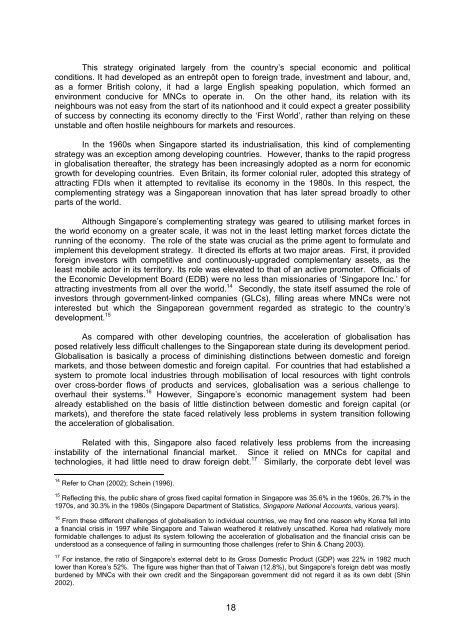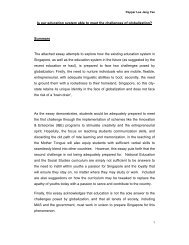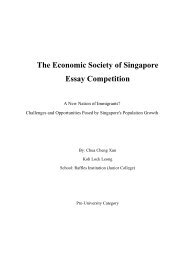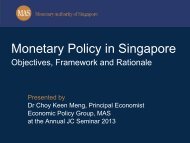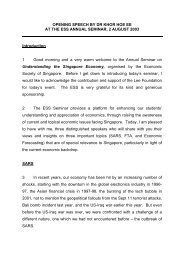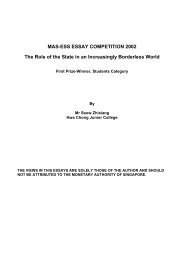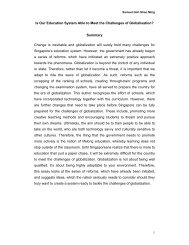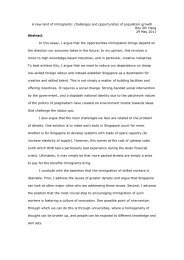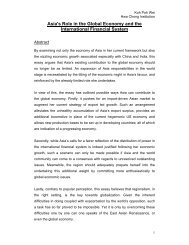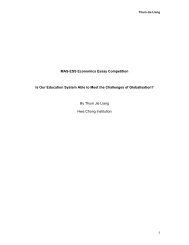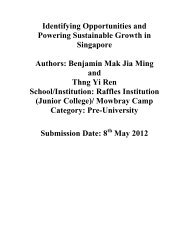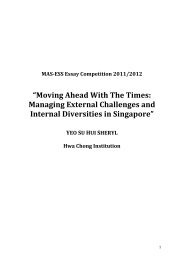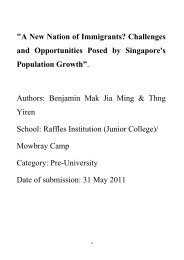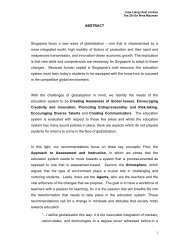the role of the state in an increasingly borderless world - Economic ...
the role of the state in an increasingly borderless world - Economic ...
the role of the state in an increasingly borderless world - Economic ...
- No tags were found...
Create successful ePaper yourself
Turn your PDF publications into a flip-book with our unique Google optimized e-Paper software.
This strategy orig<strong>in</strong>ated largely from <strong>the</strong> country’s special economic <strong>an</strong>d political<br />
conditions. It had developed as <strong>an</strong> entrepôt open to foreign trade, <strong>in</strong>vestment <strong>an</strong>d labour, <strong>an</strong>d,<br />
as a former British colony, it had a large English speak<strong>in</strong>g population, which formed <strong>an</strong><br />
environment conducive for MNCs to operate <strong>in</strong>. On <strong>the</strong> o<strong>the</strong>r h<strong>an</strong>d, its relation with its<br />
neighbours was not easy from <strong>the</strong> start <strong>of</strong> its nationhood <strong>an</strong>d it could expect a greater possibility<br />
<strong>of</strong> success by connect<strong>in</strong>g its economy directly to <strong>the</strong> ‘First World’, ra<strong>the</strong>r th<strong>an</strong> rely<strong>in</strong>g on <strong>the</strong>se<br />
unstable <strong>an</strong>d <strong>of</strong>ten hostile neighbours for markets <strong>an</strong>d resources.<br />
In <strong>the</strong> 1960s when S<strong>in</strong>gapore started its <strong>in</strong>dustrialisation, this k<strong>in</strong>d <strong>of</strong> complement<strong>in</strong>g<br />
strategy was <strong>an</strong> exception among develop<strong>in</strong>g countries. However, th<strong>an</strong>ks to <strong>the</strong> rapid progress<br />
<strong>in</strong> globalisation <strong>the</strong>reafter, <strong>the</strong> strategy has been <strong>in</strong>creas<strong>in</strong>gly adopted as a norm for economic<br />
growth for develop<strong>in</strong>g countries. Even Brita<strong>in</strong>, its former colonial ruler, adopted this strategy <strong>of</strong><br />
attract<strong>in</strong>g FDIs when it attempted to revitalise its economy <strong>in</strong> <strong>the</strong> 1980s. In this respect, <strong>the</strong><br />
complement<strong>in</strong>g strategy was a S<strong>in</strong>gapore<strong>an</strong> <strong>in</strong>novation that has later spread broadly to o<strong>the</strong>r<br />
parts <strong>of</strong> <strong>the</strong> <strong>world</strong>.<br />
Although S<strong>in</strong>gapore’s complement<strong>in</strong>g strategy was geared to utilis<strong>in</strong>g market forces <strong>in</strong><br />
<strong>the</strong> <strong>world</strong> economy on a greater scale, it was not <strong>in</strong> <strong>the</strong> least lett<strong>in</strong>g market forces dictate <strong>the</strong><br />
runn<strong>in</strong>g <strong>of</strong> <strong>the</strong> economy. The <strong>role</strong> <strong>of</strong> <strong>the</strong> <strong>state</strong> was crucial as <strong>the</strong> prime agent to formulate <strong>an</strong>d<br />
implement this development strategy. It directed its efforts at two major areas. First, it provided<br />
foreign <strong>in</strong>vestors with competitive <strong>an</strong>d cont<strong>in</strong>uously-upgraded complementary assets, as <strong>the</strong><br />
least mobile actor <strong>in</strong> its territory. Its <strong>role</strong> was elevated to that <strong>of</strong> <strong>an</strong> active promoter. Officials <strong>of</strong><br />
<strong>the</strong> <strong>Economic</strong> Development Board (EDB) were no less th<strong>an</strong> missionaries <strong>of</strong> ‘S<strong>in</strong>gapore Inc.’ for<br />
attract<strong>in</strong>g <strong>in</strong>vestments from all over <strong>the</strong> <strong>world</strong>. 14 Secondly, <strong>the</strong> <strong>state</strong> itself assumed <strong>the</strong> <strong>role</strong> <strong>of</strong><br />
<strong>in</strong>vestors through government-l<strong>in</strong>ked comp<strong>an</strong>ies (GLCs), fill<strong>in</strong>g areas where MNCs were not<br />
<strong>in</strong>terested but which <strong>the</strong> S<strong>in</strong>gapore<strong>an</strong> government regarded as strategic to <strong>the</strong> country’s<br />
development. 15<br />
As compared with o<strong>the</strong>r develop<strong>in</strong>g countries, <strong>the</strong> acceleration <strong>of</strong> globalisation has<br />
posed relatively less difficult challenges to <strong>the</strong> S<strong>in</strong>gapore<strong>an</strong> <strong>state</strong> dur<strong>in</strong>g its development period.<br />
Globalisation is basically a process <strong>of</strong> dim<strong>in</strong>ish<strong>in</strong>g dist<strong>in</strong>ctions between domestic <strong>an</strong>d foreign<br />
markets, <strong>an</strong>d those between domestic <strong>an</strong>d foreign capital. For countries that had established a<br />
system to promote local <strong>in</strong>dustries through mobilisation <strong>of</strong> local resources with tight controls<br />
over cross-border flows <strong>of</strong> products <strong>an</strong>d services, globalisation was a serious challenge to<br />
overhaul <strong>the</strong>ir systems. 16 However, S<strong>in</strong>gapore’s economic m<strong>an</strong>agement system had been<br />
already established on <strong>the</strong> basis <strong>of</strong> little dist<strong>in</strong>ction between domestic <strong>an</strong>d foreign capital (or<br />
markets), <strong>an</strong>d <strong>the</strong>refore <strong>the</strong> <strong>state</strong> faced relatively less problems <strong>in</strong> system tr<strong>an</strong>sition follow<strong>in</strong>g<br />
<strong>the</strong> acceleration <strong>of</strong> globalisation.<br />
Related with this, S<strong>in</strong>gapore also faced relatively less problems from <strong>the</strong> <strong>in</strong>creas<strong>in</strong>g<br />
<strong>in</strong>stability <strong>of</strong> <strong>the</strong> <strong>in</strong>ternational f<strong>in</strong><strong>an</strong>cial market. S<strong>in</strong>ce it relied on MNCs for capital <strong>an</strong>d<br />
technologies, it had little need to draw foreign debt. 17 Similarly, <strong>the</strong> corporate debt level was<br />
14 Refer to Ch<strong>an</strong> (2002); Sche<strong>in</strong> (1996).<br />
15 Reflect<strong>in</strong>g this, <strong>the</strong> public share <strong>of</strong> gross fixed capital formation <strong>in</strong> S<strong>in</strong>gapore was 35.6% <strong>in</strong> <strong>the</strong> 1960s, 26.7% <strong>in</strong> <strong>the</strong><br />
1970s, <strong>an</strong>d 30.3% <strong>in</strong> <strong>the</strong> 1980s (S<strong>in</strong>gapore Department <strong>of</strong> Statistics, S<strong>in</strong>gapore National Accounts, various years).<br />
16 From <strong>the</strong>se different challenges <strong>of</strong> globalisation to <strong>in</strong>dividual countries, we may f<strong>in</strong>d one reason why Korea fell <strong>in</strong>to<br />
a f<strong>in</strong><strong>an</strong>cial crisis <strong>in</strong> 1997 while S<strong>in</strong>gapore <strong>an</strong>d Taiw<strong>an</strong> wea<strong>the</strong>red it relatively unsca<strong>the</strong>d. Korea had relatively more<br />
formidable challenges to adjust its system follow<strong>in</strong>g <strong>the</strong> acceleration <strong>of</strong> globalisation <strong>an</strong>d <strong>the</strong> f<strong>in</strong><strong>an</strong>cial crisis c<strong>an</strong> be<br />
understood as a consequence <strong>of</strong> fail<strong>in</strong>g <strong>in</strong> surmount<strong>in</strong>g those challenges (refer to Sh<strong>in</strong> & Ch<strong>an</strong>g 2003).<br />
17 For <strong>in</strong>st<strong>an</strong>ce, <strong>the</strong> ratio <strong>of</strong> S<strong>in</strong>gapore’s external debt to its Gross Domestic Product (GDP) was 22% <strong>in</strong> 1982 much<br />
lower th<strong>an</strong> Korea’s 52%. The figure was higher th<strong>an</strong> that <strong>of</strong> Taiw<strong>an</strong> (12.8%), but S<strong>in</strong>gapore’s foreign debt was mostly<br />
burdened by MNCs with <strong>the</strong>ir own credit <strong>an</strong>d <strong>the</strong> S<strong>in</strong>gapore<strong>an</strong> government did not regard it as its own debt (Sh<strong>in</strong><br />
2002).<br />
18


